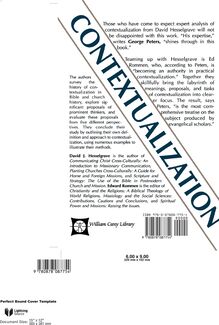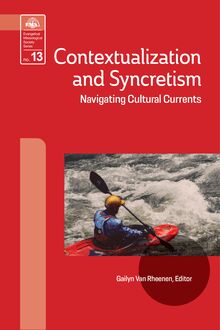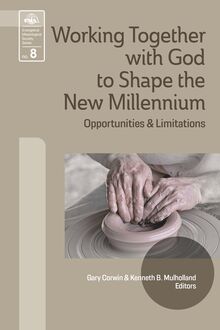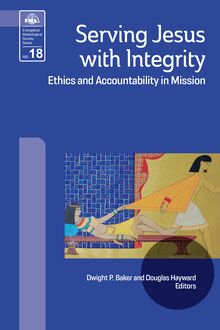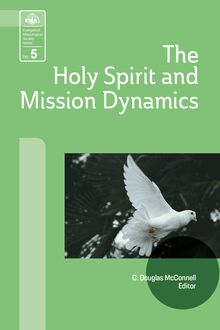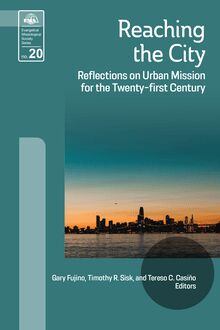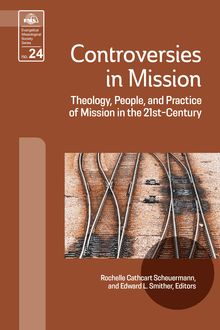-
 Univers
Univers
-
 Ebooks
Ebooks
-
 Livres audio
Livres audio
-
 Presse
Presse
-
 Podcasts
Podcasts
-
 BD
BD
-
 Documents
Documents
-
- Cours
- Révisions
- Ressources pédagogiques
- Sciences de l’éducation
- Manuels scolaires
- Langues
- Travaux de classe
- Annales de BEP
- Etudes supérieures
- Maternelle et primaire
- Fiches de lecture
- Orientation scolaire
- Méthodologie
- Corrigés de devoir
- Annales d’examens et concours
- Annales du bac
- Annales du brevet
- Rapports de stage
La lecture à portée de main
Vous pourrez modifier la taille du texte de cet ouvrage
Découvre YouScribe en t'inscrivant gratuitement
Je m'inscrisDécouvre YouScribe en t'inscrivant gratuitement
Je m'inscrisEn savoir plus
Vous pourrez modifier la taille du texte de cet ouvrage
En savoir plus

Description
Sujets
Informations
| Publié par | William Carey Publishing |
| Date de parution | 01 juin 2000 |
| Nombre de lectures | 0 |
| EAN13 | 9781645080138 |
| Langue | English |
| Poids de l'ouvrage | 1 Mo |
Informations légales : prix de location à la page 0,0800€. Cette information est donnée uniquement à titre indicatif conformément à la législation en vigueur.
Extrait
Copyright 2006 by Evangelical Missiological Society www.missiology.org/EMS
All rights reserved. No part of this work may be reproduced or transmitted in any form or by any means-for example, electronic or mechanical, including photocopying and recording-without prior written permission of the publisher. The only exceptions are brief quotations in printed reviews.
Scripture taken from the HOLY BIBLE, NEW INTERNATIONAL VERSION . Copyright 1973, 1978, 1984 International Bible Society. Used by permission of Zondervan. All rights reserved.
EMS Series No. 13
Cover Text Design: Todd Thomas
Published by William Carey Library 1605 E. Elizabeth Street Pasadena, CA 91104 | www.missionbooks.org
William Carey Library is a ministry of Frontier Ventures Pasadena, CA | www.frontierventures.org
Digital eBook Release Primalogue 2016
ISBN: 978-1-64508-013-8 (ePub)
Contents
Foreword by Gailyn Van Rheenen
Author Profiles
Defining the Issues
Chapter 1 Syncretism and Contextualization: The Church on a Journey Defining Itself
By Gailyn Van Rheenen
Chapter 2 Syncretism and Social Paradigms
By Paul H. Hiebert
Chapter 3 Contextualization. Syncretism, and Spiritual Warfare: Identifying the Issues
By Scott Moreau
Chapter 4 Syncretism: Mission and Missionary Induced?
By David J. Hesselgrave
Theological Reflections on Syncretism
Chapter 5 The Role of Context in Shaping Theology
By Steve Strauss
Chapter 6 The Lamb and The Emperor: Theologies of Revelation Countering Syncretism
By Ron Stansell
Case Studies: Contextualization and Syncretism in Living Contexts
Chapter 7 To the Muslim I became a Muslim?
By Dudley Woodberry
Chapter 8 Suburban Evangelical Individualism: Syncretism or Contextualization?
By J. Nelson Jennings
Chapter 9 Post-Constantinian Missions: Lessons from the Resurgence of Paganism
By Michael T. Cooper
Chapter 10 Dwarves, Elves, and Vampires: An Exploration of Syncretism in Metro Manila
By Cynthia A. Strong and David K. Strong
Chapter 11 Revelation in the Chinese Characters: Divine or Divined?
By How Chuang Chua
Chapter 12 You Must Not Worship in their Way When Contextualization Becomes Syncretism (Syncretism among Messianic Jews)
By Larry Poston
Chapter 13 Legalism - Syncretism From Within A Challenge in the Romanian Church
By Cristian Barbosu
Chapter 14 Syncretism and Identity Among the Bayano Kuna
By Eric J. Moeller
Chapter 15 Building Bridges to Muslims: A Test Case
By Gareth Lee Cockerill
Foreword
For many years I have contended that the largest vacuum in Missiology is the study of syncretism and the interrelated perspectives toward contextualization . I am happy to edit a volume which addresses these issues.
The book is timely. We are seeing many changes-from print media to oral transmission, from ahistorical to tradition, from propositionalism to narrative, from rationalism to embodiment, from market to mission, from rallies to relationship (Webber 2002, 7-8). Change permeates the very air we breathe. A few years ago Walter Brueggemann described this developing transition as the creation of a new interpretive situation resulting from a radical shift of categories of culture, for which interpreters of faith in the West have not been well prepared (1993, 1). Thus, as we transition from a modern to a postmodern era, the issues of contextualization and syncretism are exceptionally significant. Christianity s typical response to times of cataclysmic change is to so accommodate to the culture that the Christian message loses its divine essence.
Such accommodation is not new. Modernity s enthroning humanity and demoting God led Christians to become practicing deists. Because they could not be perceived, studied, and analyzed by the five senses, Biblical teachings about angels, demons, and Satan were considered myths. Even God was relegated to the spiritual realm, where he was allowed little authority over the world he created. Only natural powers which can be empirically analyzed were thought to operate in the natural world. Paradoxically, people viewed themselves as self-sufficient, not in need of God in the world that he created. Their world was a closed universe because natural powers were thought to operate with no interference from the spiritual realm. Even the social sciences, as described by Paul Hiebert in chapter 2 , are rooted in humanistic, modern assumptions that either compartmentalize the natural and the supernatural or negate the spiritual realm altogether.
Culture s influence upon Christianity is easier to discern in retrospect than in prospect. If history is our guide, one thing is sure: This age will be as syncretistic as any other. Ancient Israel frequently syncretized the worship of God with that of the gods. Modern, enlightenment philosophies focused on the human and disregarded the spiritual. How is the gospel being contextualized in the contemporary world? To what degree are these new contextualizations syncretistic? This book attempts to answer these questions by defining and analyzing contextualization and syncretism.
Read carefully Steve Strauss seminal writings on the role of context in shaping theology and the need to engage in intercultural theologizing. Examine my definitions of contextualization and syncretism and recontextualizations of the contemporary church in North America to reflect the mission and kingdom of God and overcome the syncretism of Modernity. Consider David Hesselgrave s belief that inducements to syncretism are built into certain missionary paradigms. Give attention as Scott Moreau addresses the syncretism implicit in certain perspectives and forms of spiritual warfare. Ponder Dudley Woodberry s important discussion of C-4 and C-5 evangelism among Muslims. Critique the syncretistic nature of suburban evangelical individualism in North America in Nelson Jennings analysis of Harvey Conn s writings. Other articles describe the reason for the rise of paganism in North America (Cooper); syncretism in Manila (Strong and Strong); revelation in Chinese characters (How Chuang Chua); how contextualization becomes syncretism among some Messianic Jews (Posten); how legalism creates syncretism in Romanian churches (Barbosu); millenarianism as ethnic defense among the Bayano Kuna of Panama (Moeller); and building Bridges to Muslims (Cockerill).
This book would not have been completed without the help of Todd and Teresa Thomas. They faithfully worked with my wife Becky and me to edit the manuscript and prepare it for publication. We appreciate them for their dedication and focus. I also thank Scott Moreau and innumerable other leaders of the Evangelical Missiological Society for their frequent help and encouragement during a period that we began a new ministry and lost our son Jonathan, who died five days short of his 35 th birthday and left behind two beautiful children Eli, age 20 months, and Eva, age 8 months. I thank Rick Kruse of William Carey Library for guiding this book through to publication. Above all, I am thankful to God who is faithful even in times of sorrow.
Dr. Gailyn Van Rheenen
Facilitator of Church Planting
Mission Alive www.missionalive.org
Works Cited
Brueggemann, Walter. 1993. Notes under Negotiation: The Bible and Postmodern Imagination . Minneapolis: Fortress Press.
Webber, Robert E. 2002. The Younger Evangelicals: Facing the Challenges of the New World . Grand Rapids: Baker.
Author Profiles
Cristian Barbosu is pastor of Metanoia Church in Arad, Romania. He has completed his BA from Moody Bible Institute, ThM from Dallas Theological Seminary, and is currently finishing up his PhD at Trinity Evangelical Divinity School. In addition to his ministry as a pastor, he serves as Vice-President of Big Impact, a Romanian interdenominational evangelical network focused in addressing the post-communist issues and training the next generation of leaders. He is married to Anne (a French MK) and has 2 daughters, Fiona and Tara.
Gareth Lee Cockerill is Professor of New Testament and Biblical Theology at Wesley Biblical Seminary, Jackson, Mississippi, U.S.A. and an ordained minister of the Wesleyan Church. He and his wife Rosa served for nine years as missionaries in Sierra Leone, West Africa, where they were engaged in evangelism, teaching, administration, and medical ministries. He received his M.Div. from Asbury Theological Seminary and a Ph.D. in New Testament from Union Theological Seminary in Virginia. Dr. Cockerill s passion is cross-cultural Biblical interpretation. He has written popular, Biblical exposition and has published articles in the Bulletin for Biblical Research, Tyndale Bulletin, Journal of Biblical Literature, The Evangelical Quarterly , and Missiology .
Michael T. Cooper served for thirteen years as a missionary in Central and Eastern Europe, and currently researches the revival of pre-Christian European religions in Western Europe and North America. He is assistant Professor of Biblical Studies and Christian Ministries at Trinity International University. He is published in Mission Studies, Christian Education Journal, Global Missiology , and Common Ground Journal and has presented papers on Paganism at various academic venues.
David J. Hesselgrave is professor emeritus of mission at Trinity Evangelical Divinity School in Deerfield, Illinois. He began teaching at Trinity in 1965 and retired in 1991. While at Trinity, he served for fourteen years as the chairman of the Mission and Evangelism Department. Though retired, he continues an active schedule of speaking and writing. He served as executive director of the Evangelical Missiological Society from 1991-1994. His publications include Communicating Christ Cross-Culturally, Counseling Cross-Culturally , and Planting Churches Cross-Culturally, Contextualization - Meanings, Methods, and Models (with Edward Rommen), and the first EMS text Scripture and Strategy .
Paul G. Hiebert served as a missionary in India, and is currently Di
-
 Univers
Univers
-
 Ebooks
Ebooks
-
 Livres audio
Livres audio
-
 Presse
Presse
-
 Podcasts
Podcasts
-
 BD
BD
-
 Documents
Documents
-
Jeunesse
-
Littérature
-
Ressources professionnelles
-
Santé et bien-être
-
Savoirs
-
Education
-
Loisirs et hobbies
-
Art, musique et cinéma
-
Actualité et débat de société
-
Jeunesse
-
Littérature
-
Ressources professionnelles
-
Santé et bien-être
-
Savoirs
-
Education
-
Loisirs et hobbies
-
Art, musique et cinéma
-
Actualité et débat de société
-
Actualités
-
Lifestyle
-
Presse jeunesse
-
Presse professionnelle
-
Pratique
-
Presse sportive
-
Presse internationale
-
Culture & Médias
-
Action et Aventures
-
Science-fiction et Fantasy
-
Société
-
Jeunesse
-
Littérature
-
Ressources professionnelles
-
Santé et bien-être
-
Savoirs
-
Education
-
Loisirs et hobbies
-
Art, musique et cinéma
-
Actualité et débat de société
- Cours
- Révisions
- Ressources pédagogiques
- Sciences de l’éducation
- Manuels scolaires
- Langues
- Travaux de classe
- Annales de BEP
- Etudes supérieures
- Maternelle et primaire
- Fiches de lecture
- Orientation scolaire
- Méthodologie
- Corrigés de devoir
- Annales d’examens et concours
- Annales du bac
- Annales du brevet
- Rapports de stage
